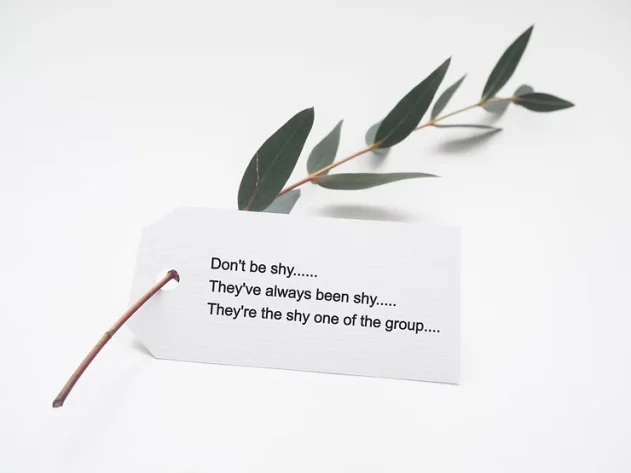Why Do We Label Someone as Shy?
It’s easy to assign labels, we do it without thinking, often as a way of explaining what we notice.
Picture a parent reassuring someone while their child hides behind their legs: “It’s okay, they’re just shy.”
Or perhaps you’ve said to a friend, “Don’t be shy!”
These phrases are familiar and usually well-intentioned, but they also shift the focus from what a person is feeling to who they supposedly are. Instead of saying, “They’re feeling nervous” or “They need a little time,” we define them as “shy.”
When I was described as shy, people weren’t exploring what I felt, they were labelling who I was. It didn’t come from a place of malice, but the message I internalised was that being shy was a problem in some way.
Don’t Call Me Shy
I can still hear it.....
“She’s always been shy.”
“That’s just how she is.”
Hearing these kinds of phrases on repeat....they began to feel like a fixed part of my identity. Each time I was introduced or described that way, I felt a pang of shame, a sense that I was somehow less than the others.
And being pointed out as “the shy one” often happened in front of others. For someone who already preferred to stay in the background, that kind of attention was overwhelming.
I didn’t feel seen for who I really was... thoughtful, observant, sensitive.... I felt exposed, vulnerable and misunderstood.
Growing Up Shy
At school, I worked hard, followed the rules, and quietly got on with things. My teachers would recognise my effort and quality of work, but my reports always included the same theme:
“Good work, but if only she’d speak up more in class.”
“Quietest one in the group.”
“Still hesitant to contribute during discussions.”
My shyness was noted repeatedly but never explored. No one asked why I found it difficult to speak up or what might help me feel safer to do so. It was treated as an inconvenient hindrance rather than a feeling to understand.
What Would Have Helped Instead
It’s quite simple really: for someone to have asked how I was feeling.
Each time I was labelled as shy, it was because someone had noticed something... my lowered gaze, the blush creeping up my cheeks, my hesitation to speak. They noticed the behaviour but didn’t reach beyond it. What I needed was for someone not to just comment but to be curious, to ask how I was, to listen gently encourage me.
If someone had said,
“You look a little nervous, how are you feeling?”
or
“Would you like a moment before you join in?”it would have made a world of difference.
Even if I couldn’t have expressed it fully, being asked would have shown me that my feelings mattered. I would have felt seen instead of dismissed, supported rather than spotlighted.
Being Shy Is Not a Flaw
In Western culture, shyness is often misunderstood. We tend to celebrate confidence, assertiveness, and extroversion, qualities that are certainly valuable, but not the only ones worth having.
Shows like The Apprentice often highlight the loudest voices as the most capable, but real life tells a different story. The world also needs the quieter thinkers, the deep listeners, the gentle observers... those who bring empathy, insight, and reflection.
Shyness isn’t a flaw; it’s a feeling. And shyness brings with it qualities that enrich relationships and communities: sensitivity, creativity, careful thought, and emotional depth.
When we move away from judgement and towards understanding, we start to see that shyness isn’t something to overcome, it’s something to understand and embrace.
A Final Thought
If you’ve ever been labelled as shy, please remember: there is nothing wrong with you.
And if you ever find yourself about to describe someone as shy, pause for a moment. Instead of labelling, try asking:
"How are you feeling?”
“Would you like more time?”
"How can I help you?"
That small shift, from labelling to listening, can turn a moment of isolation into one of connection.

